|
|
Our Holy Mother Pelagia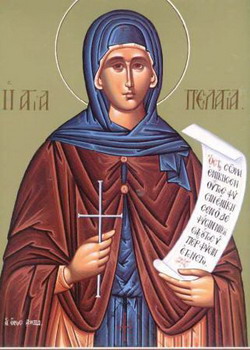 A repentant sinner, she was born a pagan in Antioch and endowed by God with great physical beauty, but she used this beauty to destroy her own soul and those of others, acquiring great wealth from her prostitution. One day, walking past the church of the holy martyr Julian, where Bishop Nonnus was preaching, she turned into the church and listened to the sermon, which was about the Dreadful Judgement and the punishment of sinners. These words so shook her, and wrought so great a change in her, that she was of a sudden filled with self-loathing and fear of God, and, repenting of all her filthy sins, fell down before St Nonnus, begging him to baptise her: "Holy father, be merciful to me, a sinner; baptise me, and teach me repentance. I am a sea of iniquity, an abyss of destruction, a net and weapon of the devil." Thus this penitent implored Christ"s hierarch with tears. And he baptised her. Blessed Romana, a deaconess of that church, stood sponsor to her at her baptism and, after that, as her spiritual mother, grounded her well in the Christian faith. But Pelagia was not content just to be baptised. Feeling the weight of her many sins and the pricking of her conscience, she decided on a great ascesis. She gave away to the poor the enormous wealth she had amassed by her immorality and went secretly to Jerusalem, where, under a man"s name as the monk Pelagius, she shut herself in a cell on the Mount of Olives and there began a strict ascesis of fasting, prayer and vigils. Three years later, St Nonnus"s deacon, James, visited her and found her still alive, but when he went to her again a few days later, he found her dead body and gave it burial. St Pelagia entered into rest in about 461. Thus that sometime great sinner, by repentance and striving, received the mercy of God, the forgiveness of her sins and sanctification, and her purified and sanctified soul was made worthy of the Kingdom of God. A repentant sinner, she was born a pagan in Antioch and endowed by God with great physical beauty, but she used this beauty to destroy her own soul and those of others, acquiring great wealth from her prostitution. One day, walking past the church of the holy martyr Julian, where Bishop Nonnus was preaching, she turned into the church and listened to the sermon, which was about the Dreadful Judgement and the punishment of sinners. These words so shook her, and wrought so great a change in her, that she was of a sudden filled with self-loathing and fear of God, and, repenting of all her filthy sins, fell down before St Nonnus, begging him to baptise her: "Holy father, be merciful to me, a sinner; baptise me, and teach me repentance. I am a sea of iniquity, an abyss of destruction, a net and weapon of the devil." Thus this penitent implored Christ"s hierarch with tears. And he baptised her. Blessed Romana, a deaconess of that church, stood sponsor to her at her baptism and, after that, as her spiritual mother, grounded her well in the Christian faith. But Pelagia was not content just to be baptised. Feeling the weight of her many sins and the pricking of her conscience, she decided on a great ascesis. She gave away to the poor the enormous wealth she had amassed by her immorality and went secretly to Jerusalem, where, under a man"s name as the monk Pelagius, she shut herself in a cell on the Mount of Olives and there began a strict ascesis of fasting, prayer and vigils. Three years later, St Nonnus"s deacon, James, visited her and found her still alive, but when he went to her again a few days later, he found her dead body and gave it burial. St Pelagia entered into rest in about 461. Thus that sometime great sinner, by repentance and striving, received the mercy of God, the forgiveness of her sins and sanctification, and her purified and sanctified soul was made worthy of the Kingdom of God.Our Holy Mother Thais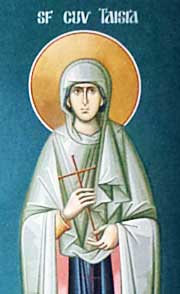 A repentant sinner, she was an Egyptian by birth. Like St Pelagia, Thaïs spent her youth in prostitution being set on the way of evil living by her shameless mother. But God the merciful, who desires not that sinners should perish but that they should be saved, found a way in His wonderful providence to save the sinful Thaïs. One of the disciples of St Antony the Great, Paphnutius the Sindonite, heard of Thaïs, of her sinful life and the spiritual poison with which she was poisoning the souls of many, and he decided, with God"s help, to save her. Holy Paphnutius, therefore, dressed himself in ordinary clothes, took a gold piece and went to the town. He found Thaïs and gave her the coin. Thaïs, thinking that the man had given her the gold piece with evil intent, took Paphnutius off to her room. Then Paphnutius opened his blessed lips and denounced Thaïs"s sin, calling her to repentance. Thaïs"s soul and conscience were roused, and she gave herself to tears of heartfelt repentance. Giving away all her goods to the needy, she went to a monastery of virgins, near to Paphnutius"s hermitage, and stayed there for about three years, shut in a cell and living only on bread and water. Just before her death, St Paphnutius visited her, and made her leave her cell against her will. She quickly fell ill and, after a short illness, gave her purified and sanctified soul to God. St Paul the Simple, another disciple of St Antony, saw in a vision in Paradise a most beautiful dwelling prepared for the penitent Thaïs. This holy soul entered into rest in about 340. A repentant sinner, she was an Egyptian by birth. Like St Pelagia, Thaïs spent her youth in prostitution being set on the way of evil living by her shameless mother. But God the merciful, who desires not that sinners should perish but that they should be saved, found a way in His wonderful providence to save the sinful Thaïs. One of the disciples of St Antony the Great, Paphnutius the Sindonite, heard of Thaïs, of her sinful life and the spiritual poison with which she was poisoning the souls of many, and he decided, with God"s help, to save her. Holy Paphnutius, therefore, dressed himself in ordinary clothes, took a gold piece and went to the town. He found Thaïs and gave her the coin. Thaïs, thinking that the man had given her the gold piece with evil intent, took Paphnutius off to her room. Then Paphnutius opened his blessed lips and denounced Thaïs"s sin, calling her to repentance. Thaïs"s soul and conscience were roused, and she gave herself to tears of heartfelt repentance. Giving away all her goods to the needy, she went to a monastery of virgins, near to Paphnutius"s hermitage, and stayed there for about three years, shut in a cell and living only on bread and water. Just before her death, St Paphnutius visited her, and made her leave her cell against her will. She quickly fell ill and, after a short illness, gave her purified and sanctified soul to God. St Paul the Simple, another disciple of St Antony, saw in a vision in Paradise a most beautiful dwelling prepared for the penitent Thaïs. This holy soul entered into rest in about 340.The Holy Martyr Pelagia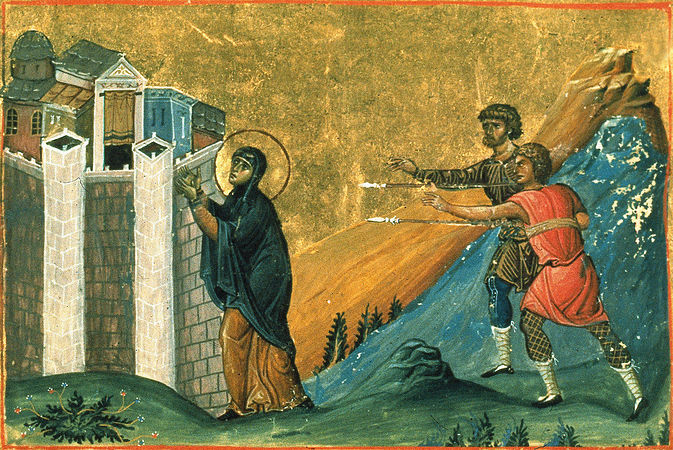 She was a virgin of an eminent family in Antioch. In the time of the Emperor Numerian, the governor of Antioch sent soldiers to bring Pelagia to trial as a known Christian. The soldiers surrounded the house and called the holy maiden to the door. She appeared, and when she heard that they had come to take her for trial, she pretended delight and asked the soldiers to wait a moment or two while she got herself ready. She then climbed up onto the roof of the house, raised her hands to heaven and prayed for a long time, begging God to receive her soul and not let her virginity be fouled. God did so, and her dead body fell in front of the soldiers. 'Her death', writes Chrysostorn, 'came about not as a natural occurrence but by the command of God', and he continues: 'And thus this virginal body, purer than any gold, lay on the earth; angels surrounded it, archangels paid it. honour and Christ Himself was with her.'
In the Slavonic Prologue there is recorded the following occurrence with an unrepentant sinner: A deacon, Raphael, was sick unto death. This was told to St Epiphanius, who loved Raphael, and the elder came to him at once. Recognising his spiritual father, Raphael began to weep and wail bitterly. Epiphanius also wept, then asked the deacon why he was in such grief. The deacon replied: 'Woe is me; devils have snatched away my works, and the angels of God have withdrawn themselves from me!' After that, he began to bleat like a goat, and then bark like a dog. And at that he gave up his soul. St Epiphanius said that this was because of some great sin, unconfessed and unrepented. She was a virgin of an eminent family in Antioch. In the time of the Emperor Numerian, the governor of Antioch sent soldiers to bring Pelagia to trial as a known Christian. The soldiers surrounded the house and called the holy maiden to the door. She appeared, and when she heard that they had come to take her for trial, she pretended delight and asked the soldiers to wait a moment or two while she got herself ready. She then climbed up onto the roof of the house, raised her hands to heaven and prayed for a long time, begging God to receive her soul and not let her virginity be fouled. God did so, and her dead body fell in front of the soldiers. 'Her death', writes Chrysostorn, 'came about not as a natural occurrence but by the command of God', and he continues: 'And thus this virginal body, purer than any gold, lay on the earth; angels surrounded it, archangels paid it. honour and Christ Himself was with her.'
In the Slavonic Prologue there is recorded the following occurrence with an unrepentant sinner: A deacon, Raphael, was sick unto death. This was told to St Epiphanius, who loved Raphael, and the elder came to him at once. Recognising his spiritual father, Raphael began to weep and wail bitterly. Epiphanius also wept, then asked the deacon why he was in such grief. The deacon replied: 'Woe is me; devils have snatched away my works, and the angels of God have withdrawn themselves from me!' After that, he began to bleat like a goat, and then bark like a dog. And at that he gave up his soul. St Epiphanius said that this was because of some great sin, unconfessed and unrepented.Venerable Dositheus, abbot of Verkneostrov (Pskov) (1482)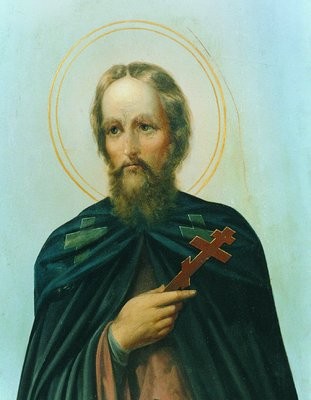 The Monk Dosiphei of Verkhneostrovsk and Pskov – was a disciple of the Monk Evphrosyn of Spasoeleazarovsk and Pskov (Comm. 15 May). In 1470 he founded the Petropavlovsk Verkhneostrov monastery at Lake Pskova, where he was hegumen. The Monk Dosiphei of Verkhneostrovsk and Pskov – was a disciple of the Monk Evphrosyn of Spasoeleazarovsk and Pskov (Comm. 15 May). In 1470 he founded the Petropavlovsk Verkhneostrov monastery at Lake Pskova, where he was hegumen.Venerable Tryphon, abbot, of Vyatka (1612)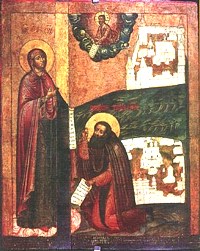 The Monk Tryphon, Archimandrite of Vyatsk, came of pious parents, living in Arkhangelsk diocese. His parents intended to marry Tryphon off, but he had from his youthful years a desire for the monastic life, and he secretly left his home for the city of Ustiug, where he took up residence with a parish priest who dwelt in strict fasting and prayer. And then he lived in the town of Orletsa nearby the church, enduring hunger and cold, and from there he moved on to the Pyshkorsk monastery at the River Kama... The Monk Tryphon, Archimandrite of Vyatsk, came of pious parents, living in Arkhangelsk diocese. His parents intended to marry Tryphon off, but he had from his youthful years a desire for the monastic life, and he secretly left his home for the city of Ustiug, where he took up residence with a parish priest who dwelt in strict fasting and prayer. And then he lived in the town of Orletsa nearby the church, enduring hunger and cold, and from there he moved on to the Pyshkorsk monastery at the River Kama... |